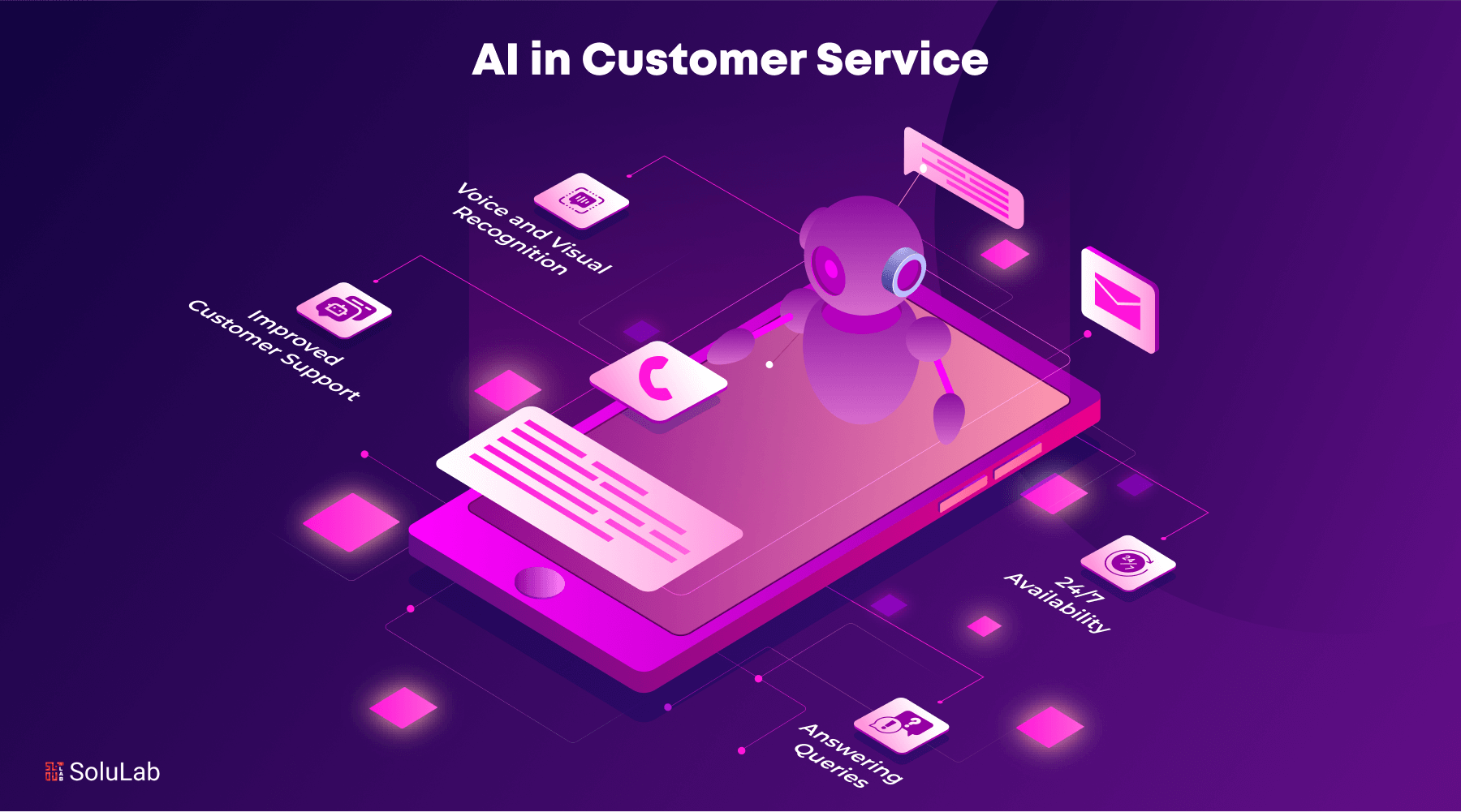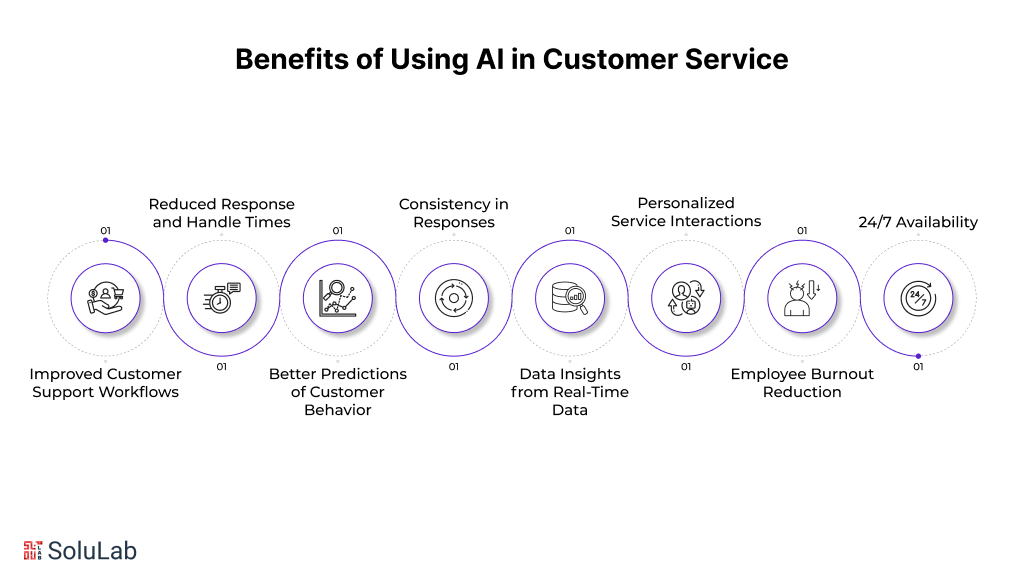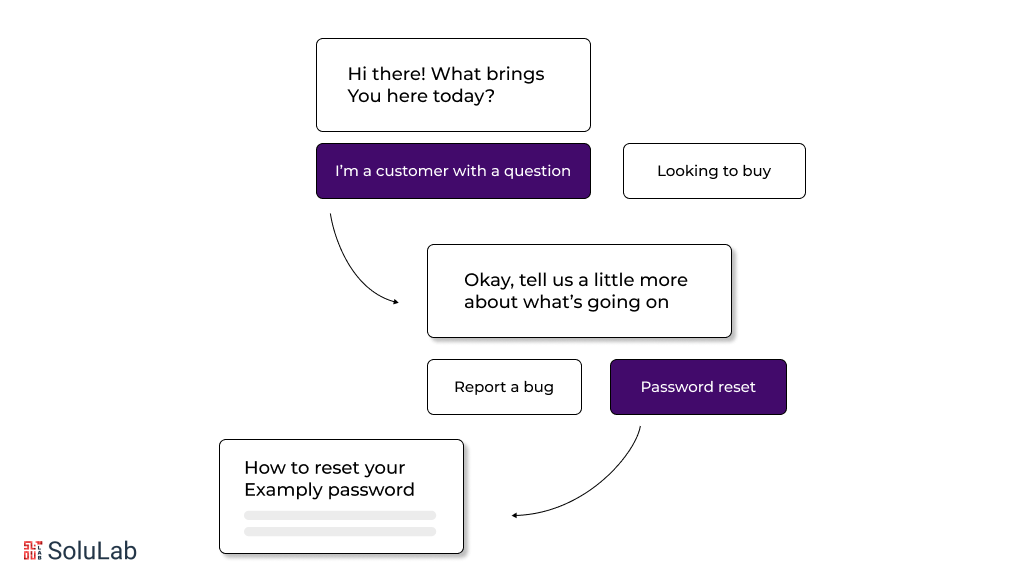
AI in customer service appears as bots collaborating with human representatives. A bot assists the customer care person in finding better solutions as the agent assists the customer. According to recent AI data, the newest generation of AI, known as generative AI, has the potential to automate up to 300 million full-time jobs globally. The two most significant applications of AI in customer care are agent augmentation and support automation.
Long back when ChatGPT was released in November 2022, artificial intelligence (AI) was used in customer support. It’s no secret that artificial intelligence (AI) has the power to drastically alter customer service interactions for businesses, staff, and clients—and it has. The conversation around artificial intelligence (AI) in customer service has taken off because of the field’s constant improvements, which range from chatbots and personalized recommendations to sophisticated speech recognition technologies.
So let’s take a look at some history, look at a few examples of AI in customer service, and discuss the advantages and difficulties that AI brings to contact centers today. In this article, we’ll also discuss how AI impacts the customer experience.
What Exactly is AI in Customer Service?
AI can be utilized in customer service in numerous ways. For instance, AI chatbots can be integrated across various channels to enhance the customer service automation experience instantly. These AI chatbots in customer service answer frequently asked questions and welcome customers, offer responses based on knowledge articles, guide users through routine processes, schedule field technicians for on-site service requests, and escalate complex queries to the appropriate representative. AI chatbots are available 24/7, ensuring customers receive assistance at any time.
From a customer’s perspective, consider a scenario where you want to return shoes and need assistance. You initiate an online chat with an agent, but wait 30 minutes for a response. However, with AI in customer service, you get a personalized reply within seconds. It’s like having a virtual assistant who not only has the expertise but also understands your specific needs and preferences. You simply explain what you need help with, and it handles the rest. It’s not necessary to look up your tracking number, send an email, or clarify the specifics of your purchase—the AI already knows all of that and can help.
Many businesses are already leveraging AI in customer service. 83% of decision-makers anticipate increased investment in this AI customer service technology within the next year, while only 6% have no plans to adopt it. These AI in customer service statistics reflect the growing trend of using AI in customer service to improve efficiency and customer satisfaction.
DO YOU KNOW?
AI chatbots can handle up to 80% of routine customer service tasks, freeing up human agents to focus on more complex issues.
Benefits of Using AI in Customer Service

AI in customer service is transforming how businesses engage with their customers, providing faster, more efficient, and personalized interactions. From enhancing productivity to improving customer experience, AI offers significant advantages that benefit both companies and customers. Here are some of the key benefits of AI in customer service:
-
Improved Customer Support Workflows
AI technology can minimize friction at almost any stage of the customer journey. Chatbots allow you to quickly answer routine queries from new customers, while AI optimizes internal workflows to enhance customer service interactions. For instance, a large percentage of incoming work can be automatically completed and then effortlessly transferred to a human representative as needed. This highlights how AI is used in customer service to improve efficiency.
-
Reduced Response and Handle Times
AI can help improve customer service response times by streamlining workflows. According to research, 64% of service leaders say that the use of AI in customer service reduces the time reps spend resolving tickets. Chatbots, for instance, can instantly respond to live chat messages, significantly reducing your support team’s first response time. This efficiency lowers your average handle time, allowing for quicker resolutions.
-
Better Predictions of Customer Behavior
Understanding customer expectations and addressing issues proactively are top challenges for service leaders. AI can predict customer behavior using real-time data on purchase history, buying habits, and preferences. Predictive AI identifies patterns, helping you address potential issues before they arise and enhancing the overall customer experience. This is a prime example of AI in customer service operations improving service quality.
-
Consistency in Responses
Providing consistent and accurate responses throughout the customer journey is critical. AI ensures that responses remain uniform and standardized, no matter the time or context of the interaction. This consistency showcases how AI is used in customer service to maintain a seamless experience.
-
Data Insights from Real-Time Data
AI tools can analyze customer service interactions to uncover trends, common issues, and areas for improvement. These insights help companies refine their products, services, and strategies based on real-time data. For instance, HubSpot’s Breeze Intelligence, powered by advanced AI and LLMs, uses real-time data to enhance CRM by improving form conversion rates and identifying buyer intent.
-
Personalized Service Interactions
Breeze Intelligence offers data enrichment that helps personalize customer service interactions. By adding more detailed information to records, such as company details and recent news, marketing and sales teams can create more personalized and relevant email content. This personalization improves response rates and helps teams provide tailored interactions before and after a purchase, ensuring customers receive the attention they deserve.
-
Employee Burnout Reduction
Artificial Intelligence is a technology meant to make jobs easier, not harder. By automating manual tasks like gathering information and managing repetitive customer service requests, AI can reduce the mental strain on employees. This allows teams to focus on complex problem-solving and strategic tasks without sacrificing quality or efficiency. The use of AI in customer service thus plays a key role in reducing burnout.
-
24/7 Availability
One of the significant benefits of AI is its ability to operate beyond your company’s time zone. Customers no longer need to wait for human support when chatbots can gather basic information and begin addressing issues before they are transferred to a representative. This ensures round-the-clock availability, which is crucial for customer satisfaction and exemplifies the strength of AI in customer service operations.
💡Pro Tip:
To enhance your customer’s experience, use omnichannel chatbots that remember customer details from all touchpoints along their journey. This eliminates the need for customers to repeat themselves, leading to a more seamless and personalized brand interaction.
Examples of AI in Customer Service
Whether you’re in a contact center or working in the field, AI applications in customer service have the potential to significantly enhance the customer experience. Here are some examples:
1. Content Generation: Generative AI can analyze customer interactions, extract key information, and create human-like responses to customer queries. This speeds up response times and boosts customer satisfaction, especially when AI utilizes CRM data and knowledge.
2. Chatbots: AI-powered chatbots manage routine customer inquiries, provide instant responses, and assist with tasks such as tracking orders, recommending products, and troubleshooting. Available 24/7, they reduce response times and improve the accessibility of customer service.
3. Natural Language Processing (NLP): NLP enables AI systems to comprehend and interpret human language, helping them analyze customer sentiment, identify needs, and provide suitable responses. It also facilitates unstructured search, allowing systems to respond to more flexible, conversational queries, enhancing chatbots and voice assistants.
4. Sentiment Analysis: AI-driven sentiment analysis tools assess customer feedback, reviews, and social media interactions to gauge sentiment. This helps businesses identify improvement areas, address concerns, and personalize experiences based on customer preferences, showcasing AI use cases in customer service.
5. Recommendation Systems: AI-powered recommendation systems analyze behavior, purchase history, and preferences to deliver personalized product or content recommendations. This helps businesses enhance cross-selling and upselling opportunities by understanding customer needs.
6. Predictive Analytics: AI-based predictive analytics leverage customer data to predict needs, behavior patterns, and potential problems. This proactive approach helps optimize resource allocation and personalize interactions, demonstrating how AI can be used in customer service.
7. Self-Service Solutions: AI-powered self-service tools like knowledge bases or FAQs use NLP to understand customer questions and provide relevant answers or troubleshooting guidance. These solutions enable customers to find information quickly without requiring human intervention.
8. Intelligent Routing: AI-based intelligent routing systems analyze incoming inquiries and direct them to the most suitable representative or department. This ensures customers are efficiently connected to someone with the relevant expertise to resolve their issues.
How AI Can Be Used in Customer Service to Enhance the Business Operations?
Here are several ways that AI ML in customer service can enhance the overall experience for both organizations and their customers:
1. Increase Productivity by Acting as a Trusted Assistant: With generative AI tools agents can quickly generate personalized replies to customer inquiries. These responses are not one-size-fits-all; AI crafts trusted, natural language responses by pulling from customer data, knowledge articles, or third-party data sources across any channel. This highlights the use of AI in customer service to improve efficiency and personalization.
2. Create Work Summaries and Mobile Work Briefings: AI can significantly boost agent productivity by automating the creation of wrap-up summaries based on case history and data. This feature is particularly useful in the field, allowing workers to receive summarized, relevant data before starting tasks — saving time and improving service quality.
3. Preserve and Share Knowledge Across Your Business: By integrating AI into your service console, it can draft knowledge base articles based on customer conversations and CRM data for agents to review. This not only speeds up article creation but also empowers customers to find their solutions through self-service portals, further underlining the role of AI in customer service.
4. Search for Answers: As customers or agents seek answers, AI surfaces relevant responses from the knowledge base directly onto the search page, saving time and improving efficiency for both parties.
4 Key AI Use Cases in Customer Service for Businesses
1. AI-Supported Human Customer Service
AI, when combined with human agents, can optimize customer service by taking care of simpler tasks like case management and call routing. This allows human agents to focus on more complex queries, enhancing the overall experience. AI plays a vital role by:
- Maintaining Context: AI quickly retrieves customer data from CRM, sales, and marketing records, enabling agents to continue conversations seamlessly. This feature is especially useful with omnichannel AI chatbots in customer service<, which allow for a smooth flow of customer interactions across different platforms, ensuring customers don’t need to repeat themselves.
- Answering Routine Queries Independently: By diverting simple questions to AI-powered FAQ chatbots, businesses can reduce call volume and help agents prioritize more complex tasks. This use of AI chatbots in customer service improves resolution time and reduces workload.

- Intelligent Routing: AI can filter and direct customer inquiries to agents with the necessary expertise, taking into account agent availability and workload. This makes addressing problems quicker and more precise.
- Timely Recommendations: AI provides agents with real-time access to relevant content and product recommendations during calls, helping them deliver more efficient and personalized support.
💡Pro Tip
To maximize effectiveness, implement omnichannel chatbots capable of accessing and retrieving customer details from every touchpoint in their brand journey. This eliminates the need for customers to repeat their information, significantly improving the overall experience and fostering a more seamless, personalized interaction.
2. AI-Organized Email Inquiries
Handling emails can be overwhelming, but AI can streamline this process by:
- Scanning and tagging emails to ensure they are routed to the correct department for swift resolutions.
- Auto-suggesting responses based on previous successful interactions.
- Clearing out spam and promotional emails, freeing up time for agents to focus on critical messages.
By utilizing AI in email management, companies can improve response times and provide customers with more personalized and timely support.
3. AI-Enhanced Call Management
Although challenging, AI has been integrated into call centers through speech analytics and AI-based voice technologies. This is crucial as customers still prefer phone support for complex issues. AI enhances call management by:
- Capturing spoken input, using neural networks to filter out background noise.
- Using NLP and NLU models to understand the intent behind customer queries.
- Delivering accurate responses through text-to-speech technology, allows the AI to communicate solutions audibly.
This AI-driven process enhances the customer experience in voice communications, a key AI use cases in customer service.

4. Visual Recognition for Product Support
AI-powered visual recognition allows customers to share images or videos of product issues, helping AI systems identify and diagnose problems more intuitively. Through recognition algorithms, AI provides visual instructions, empowering customers to resolve issues independently. This reduces reliance on text-based support and improves accessibility for a more streamlined support process.
How to Integrate Artificial Intelligence and Customer Service?
Integrating generative AI in customer service using technologies like Machine Learning (ML) and Computer Vision can significantly boost both efficiency and customer satisfaction. Follow this seven-step process for a successful integration:
1. Understand Data Types
Data in customer service is derived from interactions, transactions, and feedback. It includes text, images, videos, and numerical data, categorized as:
- Structured data: Data like customer satisfaction scores (CSAT) and analytics that can be efficiently processed for decision-making.
- Unstructured data: This includes audio, video, and free-form responses that do not follow a predefined format, making them harder to analyze.
- Semi-structured data: Examples include CRM messages, which mix both structured and unstructured elements, requiring specialized analysis techniques.
2. Perform Data Structuring and Labeling
Before inputting data into an AI model, ensure it’s structured properly. Use tools to clean, format, and categorize data based on factors like customer demographics and purchase history. This helps train the AI model effectively.
3. Best Practices for Data Collection
High-quality data is critical for AI training. Here are key do’s and don’ts:
Do’s:
- Focus on accurate, relevant data, prioritizing quality over quantity to ensure model precision.
- To protect client information, make sure that data privacy standards are followed.
Don’ts:
- Avoid biased data collection to prevent inaccurate or skewed results.
- Refrain from over-collecting data, which can lead to increased storage costs and misuse of sensitive information.
4. Build Support-Specific Intents
To make AI effective, analyze customer queries for common themes. Build intents aligned with recurring issues and customer journeys.
💡Pro Tip:
Platforms like Sprinklr AI+ offer pre-built intents across over 150 industries, accelerating AI deployment for customer service.
5. Train the AI Model on Proprietary Data
Training the AI on proprietary data ensures it aligns with your business needs.
- Focus on feature engineering, selecting relevant data features for optimal customer service outcomes.
- Use transfer learning techniques to fine-tune a pre-trained model based on your proprietary data.
- Employ human review during training to assess and improve the model’s predictions.
6. Integrate the AI Model with Workflows
Once the AI model is trained, integrate it into existing customer service workflows. Implement a data management system to organize and process customer queries efficiently. Incorporate technologies like AI chatbots in customer service to deliver quick, automated responses.
7. Test and Update AI Models Regularly
Continuously test both the agent-facing and customer-facing AI interfaces:
- Agent-side Testing: Evaluate how well the AI assists agents with query handling and data access. Gather feedback on usability to improve the interface.
- Customer-side Testing: Assess how users interact with the AI, focusing on ease of query submission and clarity of responses. Regularly update the AI model based on customer feedback to improve performance and satisfaction.
- By following these steps, you can effectively leverage AI use cases in customer service and improve overall business operations through efficient, automated processes.
The Future of AI in Customer Service
The integration of AI in customer service is poised to redefine how businesses interact with their customers. With rapid advancements in technologies like Generative AI, Natural Language Processing (NLP), and Machine Learning (ML), the future of customer service is set to become more efficient, personalized, and scalable.
-
Hyper-Personalization
As AI systems become more advanced, they will be able to deliver hyper-personalized experiences. Future AI-powered platforms will analyze massive amounts of customer data in real time to predict preferences and tailor interactions. This means that each customer query will be addressed not just based on immediate input, but with a deeper understanding of the customer’s entire history with the brand, enabling companies to deliver tailored recommendations, personalized offers, and proactive support.
-
AI-Driven Omnichannel Support
The future will see AI systems managing customer queries across multiple channels seamlessly. AI will continue to evolve to understand and manage communication across platforms, from social media to voice calls, live chat, and even augmented reality (AR). This omnichannel support will be backed by intelligent systems that offer consistent service across every touchpoint, allowing customers to transition between channels without repeating information.
-
AI-Powered Emotional Intelligence
One of the critical challenges AI currently faces is understanding emotional context. However, future AI systems, enhanced by sentiment analysis and emotional AI, will be able to assess customer emotions more accurately, adjusting their responses based on mood and urgency. This emotional intelligence will lead to improved interactions where AI responds empathetically, further narrowing the gap between human and machine customer support.
-
Autonomous Support Systems
With Generative AI for customer service advancements, the future of this service will lean more towards autonomous support, where AI systems can handle increasingly complex queries without human intervention. These systems will use deep learning algorithms to not only resolve issues but also anticipate and prevent potential customer problems before they arise. This will lead to fewer escalations to human agents, allowing them to focus on high-value tasks and critical cases.
-
Augmented Human Agents
AI in customer service will continue to support human agents, enhancing their capabilities. Future AI-driven systems will provide agents with real-time insights, knowledge-based suggestions, and even live translations. As these systems like AI and ML in data integration improve, they will empower agents with the tools to handle complex cases more efficiently and reduce the cognitive load during interactions.
-
Voice and Visual Recognition
The future of AI in customer service will expand beyond text-based communication. Innovations in voice and visual recognition technologies will enable AI to offer support through new formats. Customers will be able to receive support via video, where AI will assist with product tutorials or troubleshooting based on image and voice inputs.
In summary, AI use cases in customer service will continue to grow, making it more personalized, efficient, and emotionally aware. By reducing response times, improving accuracy, and enhancing customer experiences, AI is set to play an indispensable role in shaping the future of customer service.
How SoluLab Can Improve the Performance of AI in Customer Service?
At SoluLab, as an AI development company, we specialize in enhancing AI-driven customer service by deploying advanced technologies like Generative AI, Machine Learning, and Natural Language Processing (NLP). Our tailored AI development solutions focus on optimizing both automation and human-agent support to create a seamless, efficient experience for your customers. We use AI chatbots to address standard inquiries, cutting down on wait times and giving your human agents more time for advanced tasks. Additionally, our AI systems can integrate omnichannel customer data, ensuring that customers enjoy a personalized experience without having to repeat themselves across different touchpoints.
We also leverage sentiment analysis and emotional AI to ensure that your customer service is not just functional but empathetic for various AI development companies. Our AI tools can detect customer sentiment, allowing your team to respond with the right tone and urgency. With real-time data analytics and predictive insights, SoluLab helps businesses provide proactive customer service, anticipating issues before they arise and resolving them quickly. If you’re looking to transform your customer service capabilities and boost performance through AI, contact us today to hire AI developers and discover how SoluLab can elevate your customer service with the latest AI technology!
FAQs
1. How is AI applied in customer service?
AI is commonly used in customer service through chatbots, virtual assistants, and automated ticketing systems. It helps companies respond to inquiries, automate routine tasks, route queries to the appropriate departments, and even offer personalized recommendations based on customer data. AI tools also assist in analyzing large volumes of data for better decision-making.
2. Which industries benefit the most from AI in customer service?
Industries like retail, banking, healthcare, telecommunications, and e-commerce see significant benefits from AI in customer service. AI-powered tools streamline customer interactions, providing faster responses and personalized support. These sectors, where customer satisfaction is crucial, use AI to improve efficiency, reduce response time, and offer a better overall experience.
3. Will AI replace customer service?
AI is unlikely to fully replace human customer service but will act as a powerful tool to complement it. While AI excels in handling routine inquiries and automating processes, human agents are still needed for complex issues that require empathy, creativity, and problem-solving. Together, they create a more efficient and balanced customer service experience.
4. How can AI be used to engage customers?
AI engages customers by offering personalized experiences, like recommending products based on past purchases or predicting their needs before they even ask. Through AI chatbots, natural language processing, and predictive analytics, businesses can interact with customers in real time, providing relevant responses and support across multiple channels.
5. What is the future of AI in customer service?
The future of AI in customer service involves more advanced personalization, predictive support, and omnichannel experiences. With technologies like generative AI, companies will be able to automate more complex tasks and offer proactive service. AI will continue to assist in understanding customer behavior and preferences, driving seamless, intuitive support systems.
6. How can companies secure data when using AI for customer service?
To keep data secure, businesses should implement encryption, strict access controls, and regular security audits. Ensuring compliance with data privacy regulations, such as GDPR, and using AI systems that follow best practices for handling sensitive information can help safeguard customer data while benefiting from AI’s capabilities.
7. How can SoluLab enhance AI in your customer service?
SoluLab, an AI consulting company, specializes in developing custom AI solutions that improve customer service efficiency. From implementing intelligent chatbots to integrating machine learning for personalized experiences, SoluLab ensures that AI systems are tailored to meet the unique needs of your business, delivering outstanding customer experiences.






